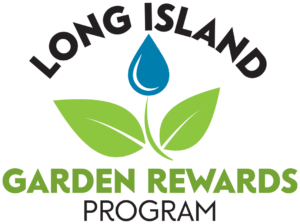Due to the high participation in the program, as of May 20, 2025 the Long Island Garden Rewards Program will be closed. Thank you to all who participated. Check back for when applications open again!
The Problem with Nitrogen
Nitrogen is the leading cause of water quality deterioration on Long Island. Excess nitrogen can be transported into our waterways by rainfall-known as stormwater runoff- and can impact the environment. Excess nitrogen can cause toxic algal blooms that lead to low oxygen conditions, fish kills, degraded wetlands, and marine habitats.
Many efforts to mitigate and reduce nitrogen pollution are underway on Long Island. One way everyone can contribute to reducing nitrogen pollution is by transitioning to more sustainable landscaping practices. Practices like planting rain gardens, installing rain barrels, and utilizing native plants all play a role in reducing and even treating stormwater.
Learn more about the impacts of nitrogen on the waters of Long Island.
Be a Part of the Solution Today!
Multiple municipalities, agencies, and organizations across Long Island provide reimbursement programs for residents who implement select sustainable landscaping practices on their properties. A list of these programs has been compiled below:
Eligible for all Long Island residents, receive reimbursement up to $500 for installing a rain barrel, constructing a rain garden, or planting native plants on your property.
Eligible for residents within the Peconic Estuary Watershed. Homeowners can earn up to $500 to offset the expense of installing green infrastructure on their properties including rain barrels, rain gardens, and native plant gardens.
Eligible for all Town of North Hempstead residents. Receive a reimbursement up to $350 (1 per household) for purchasing and planting native plants on your property.
Where to Buy Native Plants
It can be a challenge to find a nursery that sells native plants. Check out these exclusively native nurseries below:
Long Island Native Plant Initiative
*If you are interested in participating in any of the reimbursement programs, ensure that you have reviewed which native plants are eligible under each program.
Additional Resources
Long Island Nitrogen Action Plan (LINAP)
The Long Island Nitrogen Action Plan (LINAP) is an initiative to reduce the amount of nitrogen entering Long Island’s groundwater and surface water from wastewater (sewer and septic systems), stormwater runoff, and fertilizers. LINAP is led by the New York State Department of Environmental Conservation and the Long Island Regional Planning Council along with Nassau and Suffolk counties, with input from multiple partners and stakeholders. Sign up for the LINAP newsletter here.
Estuary Programs
There are three estuary programs across Long Island, the Long Island Sound Study, the Peconic Estuary Partnership, and the South Shore Estuary Reserve. These programs manage, protect, and restore the essential estuarine habitats that provide habitat for wildlife and protection against storms for coastal communities. Learn more about each Long Island estuary by visiting their webpages below!
The Long Island Native Plant Initiative (LINPI)
The Long Island Native Plant Initiative is a non-profit located in Brentwood, NY. LINPI is committed to conserving biodiversity by promoting the planting of native species across Long Island. LINPI hosts native plant sales throughout the year, as well as opportunities to volunteer at their greenhouse. Visit the Long Island Native Plant Initiative webpage here.
Long Island Commission for Aquifer Protection (LICAP)
The Long Island Commission for Aquifer Protection is a bi-county organization formed in 2013 to address both water quality and quantity issues faced by Long Island’s sole source aquifer. Visit their Our Water Our Lives webpage to learn more about water conservation practices you can adopt!
Cornell Cooperative Extension – Nassau and Suffolk County
Both Nassau and Suffolk County have a Cornell Cooperative Extension Office. These offices provide resources on gardening, horticulture, proper plant care and more. Both offices also provide soil testing services, which can be a good place to start when considering a gardening or yard care project to better understand the nutrient makeup of your soil. Visit the Nassau and Suffolk Cornell Cooperative Extension webpages for more information.
Soil and Water Conservation Districts-Nassau and Suffolk Soil and Water Conservation Districts are local units of dedicated stakeholders that develop, manage, and direct natural resource programs at the community level. The Districts offer educational programs and technical assistance to residents, landowners, and local governments to conserve and promote healthy soil, protect water quality, and support wildlife. Visit the Nassau and Suffolk County Soil and Water Conservation District websites for more information.



